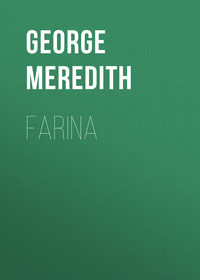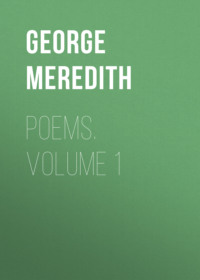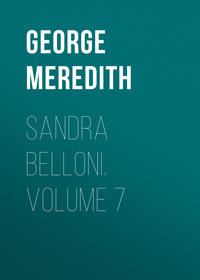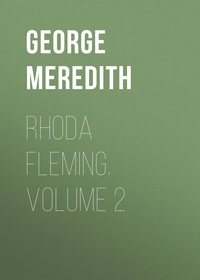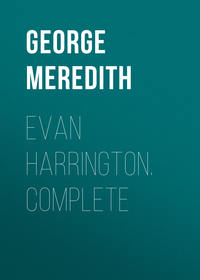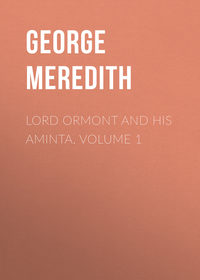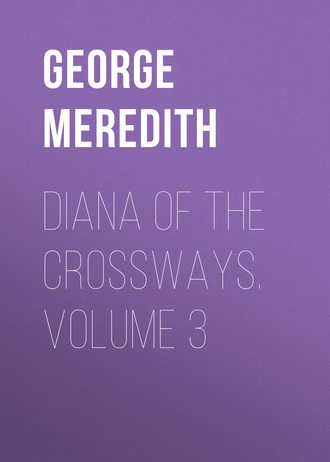
Diana of the Crossways. Volume 3
She suggested advice to Arthur Rhodes upon the prudence of his resuming the yoke of the Law.
He laughed at such a notion, saying that he had some expectations of money to come.
'But I fear,' said he, 'that Lady Dunstane is very very ill. She begged me to keep her informed of your address.'
Diana told him he was one of those who should know it whithersoever she went. She spoke impulsively, her sentiments of friendliness for the youth being temporarily brightened by the strangeness of Emma's conduct in deputing it to him to fulfil a duty she had never omitted. 'What can she think I am going to do!'
On her table at home lay, a letter from Mr. Warwick. She read it hastily in the presence of Arthur Rhodes, having at a glance at the handwriting anticipated the proposal it contained and the official phrasing.
Her gallant squire was invited to dine with her that evening, costume excused.
They conversed of Literature as a profession, of poets dead and living, of politics, which he abhorred and shied at, and of his prospects. He wrote many rejected pages, enjoyed an income of eighty pounds per annum, and eked out a subsistence upon the modest sum his pen procured him; a sum extremely insignificant; but great Nature was his own, the world was tributary to him, the future his bejewelled and expectant bride. Diana envied his youthfulness. Nothing is more enviable, nothing richer to the mind, than the aspect of a cheerful poverty. How much nobler it was, contrasted with Redworth's amassing of wealth!
When alone, she went to her bedroom and tried to write, tried to sleep. Mr. Warwick's letter was looked at. It seemed to indicate a threat; but for the moment it did not disturb her so much as the review of her moral prostration. She wrote some lines to her lawyers, quoting one of Mr. Warwick's sentences. That done, his letter was dismissed. Her intolerable languor became alternately a defeating drowsiness and a fever. She succeeded in the effort to smother the absolute cause: it was not suffered to show a front; at the cost of her knowledge of a practised self-deception. 'I wonder whether the world is as bad as a certain class of writers tell us!' she sighed in weariness, and mused on their soundings and probings of poor humanity, which the world accepts for the very bottom truth if their dredge brings up sheer refuse of the abominable. The world imagines those to be at our nature's depths who are impudent enough to expose its muddy shallows. She was in the mood for such a kind of writing: she could have started on it at once but that the theme was wanting; and it may count on popularity, a great repute for penetration. It is true of its kind, though the dredging of nature is the miry form of art. When it flourishes we may be assured we have been overenamelling the higher forms. She felt, and shuddered to feel, that she could draw from dark stores. Hitherto in her works it had been a triumph of the good. They revealed a gaping deficiency of the subtle insight she now possessed. 'Exhibit humanity as it is, wallowing, sensual, wicked, behind the mask,' a voice called to her; she was allured by the contemplation of the wide-mouthed old dragon Ego, whose portrait, decently painted, establishes an instant touch of exchange between author and public, the latter detected and confessing. Next to the pantomime of Humour and Pathos, a cynical surgical knife at the human bosom seems the surest talisman for this agreeable exchange; and she could cut. She gave herself a taste of her powers. She cut at herself mercilessly, and had to bandage the wound in a hurry to keep in life.
Metaphors were her refuge. Metaphorically she could allow her mind to distinguish the struggle she was undergoing, sinking under it. The banished of Eden had to put on metaphors, and the common use of them has helped largely to civilize us. The sluggish in intellect detest them, but our civilization is not much indebted to that major faction. Especially are they needed by the pedestalled woman in her conflict with the natural. Diana saw herself through the haze she conjured up. 'Am I worse than other women?' was a piercing twithought. Worse, would be hideous isolation. The not worse, abased her sex. She could afford to say that the world was bad: not that women were.
Sinking deeper, an anguish of humiliation smote her to a sense of drowning. For what of the poetic ecstasy on her Salvatore heights had not been of origin divine? had sprung from other than spiritual founts? had sprung from the reddened sources she was compelled to conceal? Could it be? She would not believe it. But there was matter to clip her wings, quench her light, in the doubt.
She fell asleep like the wrecked flung ashore.
Danvers entered her room at an early hour for London to inform her that
Mr. Percy Dacier was below, and begged permission to wait.
Diana gave orders for breakfast to be proposed to him. She lay staring at the wall until it became too visibly a reflection of her mind.
CHAPTER XXV
ONCE MORE THE CROSSWAYS AND A CHANGE OF TURNINGS
The suspicion of his having come to impart the news of his proximate marriage ultimately endowed her with sovereign calmness. She had need to think it, and she did. Tea was brought to her while she dressed; she descended the stairs revolving phrases of happy congratulation and the world's ordinary epigrams upon the marriage-tie, neatly mixed.
They read in one another's faces a different meaning from the empty words of excuse and welcome. Dacier's expressed the buckling of a strong set purpose; but, grieved by the look of her eyes, he wasted a moment to say: 'You have not slept. You have heard . . . ?'
'What?' said she, trying to speculate; and that was a sufficient answer.
'I hadn't the courage to call last night; I passed the windows. Give me your hand, I beg.'
She gave her hand in wonderment, and more wonderingly felt it squeezed. Her heart began the hammerthump. She spoke an unintelligible something; saw herself melting away to utter weakness-pride, reserve, simple prudence, all going; crumbled ruins where had stood a fortress imposing to men. Was it love? Her heart thumped shiveringly.
He kept her hand, indifferent to the gentle tension.
'This is the point: I cannot live without you: I have gone on . . .
Who was here last night? Forgive me.'
'You know Arthur Rhodes.'
'I saw him leave the door at eleven. Why do you torture me? There's no time to lose now. You will be claimed. Come, and let us two cut the knot. It is the best thing in the world for me—the only thing. Be brave! I have your hand. Give it for good, and for heaven's sake don't play the sex. Be yourself. Dear soul of a woman! I never saw the soul in one but in you. I have waited: nothing but the dread of losing you sets me speaking now. And for you to be sacrificed a second time to that—! Oh, no! You know you can trust me. On my honour, I take breath from you. You are my better in everything—guide, goddess, dearest heart! Trust me; make me master of your fate.'
'But my friend!' the murmur hung in her throat. He was marvellously transformed; he allowed no space for the arts of defence and evasion.
'I wish I had the trick of courting. There's not time; and I 'm a simpleton at the game. We can start this evening. Once away, we leave it to them to settle the matter, and then you are free, and mine to the death.'
'But speak, speak! What is it?' Diana said.
'That if we delay, I 'm in danger of losing you altogether.'
Her eyes lightened: 'You mean that you have heard he has determined—?'
'There's a process of the law. But stop it. Just this one step, and it ends. Whether intended or not, it hangs over you, and you will be perpetually tormented. Why waste your whole youth?—and mine as well! For I am bound to you as much as if we had stood at the altar—where we will stand together the instant you are free.'
'But where have you heard . . .?
'From an intimate friend. I will tell you—sufficiently intimate—from Lady Wathin. Nothing of a friend, but I see this woman at times. She chose to speak of it to me it doesn't matter why. She is in his confidence, and pitched me a whimpering tale. Let those people chatter. But it 's exactly for those people that you are hanging in chains, all your youth shrivelling. Let them shout their worst! It's the bark of a day; and you won't hear it; half a year, and it will be over, and I shall bring you back—the husband of the noblest bride in Christendom! You don't mistrust me?'
'It is not that,' said she. 'But now drop my hand. I am imprisoned.'
'It's asking too much. I've lost you—too many times. I have the hand and I keep it. I take nothing but the hand. It's the hand I want. I give you mine. I love you. Now I know what love is!—and the word carries nothing of its weight. Tell me you do not doubt my honour.'
'Not at all. But be rational. I must think, and I cannot while you keep my hand.'
He kissed it. 'I keep my own against the world.'
A cry of rebuke swelled to her lips at his conqueror's tone. It was not uttered, for directness was in his character and his wooing loyal—save for bitter circumstances, delicious to hear; and so narrow was the ring he had wound about her senses, that her loathing of the circumstances pushed her to acknowledge within her bell of a heart her love for him.
He was luckless enough to say: 'Diana!'
It rang horridly of her husband. She drew her hand to loosen it, with repulsing brows. 'Not that name!'
Dacier was too full of his honest advocacy of the passionate lover to take a rebuff. There lay his unconscious mastery, where the common arts of attack would have tripped him with a quick-witted woman, and where a man of passion, not allowing her to succumb in dignity, would have alarmed her to the breaking loose from him.
'Lady Dunstane calls you Tony.'
'She is my dearest and oldest friend.'
'You and I don't count by years. You are the dearest to me on earth,
Tony!'
She debated as to forbidding that name.
The moment's pause wrapped her in a mental hurricane, out of which she came with a heart stopped, her olive cheeks ashen-hued. She had seen that the step was possible.
'Oh! Percy, Percy, are we mad?'
'Not mad. We take what is ours. Tell me, have I ever, ever disrespected you? You were sacred to me; and you are, though now the change has come. Look back on it—it is time lost, years that are dust. But look forward, and you cannot imagine our separation. What I propose is plain sense for us two. Since Rovio, I have been at your feet. Have I not some just claim for recompense? Tell me! Tony!'
The sweetness of the secret name, the privileged name, in his mouth stole through her blood, melting resistance.
She had consented. The swarthy flaming of her face avowed it even more than the surrender of her hand. He gained much by claiming little: he respected her, gave her no touches of fright and shame; and it was her glory to fall with pride. An attempt at a caress would have awakened her view of the whitherward: but she was treated as a sovereign lady rationally advised.
'Is it since Rovio, Percy?'
'Since the morning when you refused me one little flower.'
'If I had given it, you might have been saved!'
'I fancy I was doomed from the beginning.'
'I was worth a thought?'
'Worth a life! worth ten thousand!'
'You have reckoned it all like a sane man:—family, position, the world, the scandal?'
'All. I have long known that you were the mate for me. You have to weather a gale, Tony. It won't last. My dearest! it won't last many months. I regret the trial for you, but I shall be with you, burning for the day to reinstate you and show you the queen you are.'
'Yes, we two can have no covert dealings, Percy,' said Diana. They would be hateful—baseness! Rejecting any baseness, it seemed to her that she stood in some brightness. The light was of a lurid sort. She called on her heart to glory in it as the light of tried love, the love that defied the world. Her heart rose. She and he would at a single step give proof of their love for one another—and this kingdom of love—how different from her recent craven languors!—this kingdom awaited her, was hers for one word; and beset with the oceans of enemies, it was unassailable. If only they were true to the love they vowed, no human force could subvert it: and she doubted him as little as of herself. This new kingdom of love, never entered by her, acclaiming her, was well-nigh unimaginable, in spite of the many hooded messengers it had despatched to her of late. She could hardly believe that it had come.
'But see me as I am,' she said; she faltered it through her direct gaze on him.
'With chains to strike off? Certainly; it is done,' he replied.
'Rather heavier than those of the slave-market! I am the deadest of burdens. It means that your enemies, personal—if you have any, and political—you have numbers; will raise a cry . . . . Realize it. You may still be my friend. I forgive the bit of wildness.'
She provoked a renewed kissing of her hand; for magnammity in love is an overflowing danger; and when he said: 'The burden you have to bear outweighs mine out of all comparison. What is it to a man—a public man or not! The woman is always the victim. That's why I have held myself in so long:—her strung frame softened. She half yielded to the tug on her arm.
'Is there no talking for us without foolishness?' she murmured. The foolishness had wafted her to sea, far from sight of land. 'Now sit, and speak soberly. Discuss the matter.—Yes, my hand, but I must have my wits. Leave me free to use them till we choose our path. Let it be the brains between us, as far as it can. You ask me to join my fate to yours. It signifies a sharp battle for you, dear friend; perhaps the blighting of the most promising life in England. One question is, can I countervail the burden I shall be, by such help to you as I can afford? Burden, is no word—I rake up a buried fever. I have partially lived it down, and instantly I am covered with spots. The old false charges and this plain offence make a monster of me.'
'And meanwhile you are at the disposal of the man who falsely charged you and armed the world against you,' said Dacier.
'I can fly. The world is wide.'
'Time slips. Your youth is wasted. If you escape the man, he will have triumphed in keeping you from me. And I thirst for you; I look to you for aid and counsel; I want my mate. You have not to be told how you inspire me? I am really less than half myself without you. If I am to do anything in the world, it must be with your aid, you beside me. Our hands are joined: one leap! Do you not see that after . . . well, it cannot be friendship. It imposes rather more on me than I can bear. You are not the woman to trifle; nor I; Tony, the man for it with a woman like you. You are my spring of wisdom. You interdict me altogether—can you?—or we unite our fates, like these hands now. Try to get yours away!'
Her effort ended in a pressure. Resistance, nay, to hesitate at the joining of her life with his after her submission to what was a scorching fire in memory, though it was less than an embrace, accused her of worse than foolishness.
'Well, then,' said she, 'wait three days. Deliberate. Oh! try to know yourself, for your clear reason to guide you. Let us be something better than the crowd abusing us, not simple creatures of impulse—as we choose to call the animal. What if we had to confess that we took to our heels the moment the idea struck us! Three days. We may then pretend to a philosophical resolve. Then come to me: or write to me.'
'How long is it since the old Rovio morning, Tony?'
'An age.'
'Date my deliberations from that day.'
The thought of hers having to be dated possibly from an earlier day, robbed her of her summit of feminine isolation, and she trembled, chilled and flushed; she lost all anchorage.
'So it must be to-morrow,' said he, reading her closely, 'not later.
Better at once. But women are not to be hurried.'
'Oh! don't class me, Percy, pray! I think of you, not of myself.'
'You suppose that in a day or two I might vary?'
She fixed her eyes on him, expressing certainty of his unalterable stedfastness. The look allured. It changed: her head shook. She held away and said: 'No, leave me; leave me, dear, dear friend. Percy, my dearest! I will not "play the sex." I am yours if . . . if it is your wish. It may as well be to-morrow. Here I am useless; I cannot write, not screw a thought from my head. I dread that "process of the Law" a second time. To-morrow, if it must be. But no impulses. Fortune is blind; she may be kind to us. The blindness of Fortune is her one merit, and fools accuse her of it, and they profit by it! I fear we all of us have our turn of folly: we throw the stake for good luck. I hope my sin is not very great. I know my position is desperate. I feel a culprit. But I am sure I have courage, perhaps brains to help. At any rate, I may say this: I bring no burden to my lover that he does not know of.'
Dacier pressed her hand. 'Money we shall have enough. My uncle has left me fairly supplied.'
'What would he think?' said Diana, half in a glimpse of meditation.
'Think me the luckiest of the breeched. I fancy I hear him thanking you for "making a man" of me.'
She blushed. Some such phrase might have been spoken by Lord
Dannisburgh.
'I have but a poor sum of money,' she said. 'I may be able to write abroad. Here I cannot—if I am to be persecuted.'
'You shall write, with a new pen!' said Dacier. 'You shall live, my darling Tony. You have been held too long in this miserable suspension, neither maid nor wife, neither woman nor stockfish. Ah! shameful. But we 'll right it. The step, for us, is the most reasonable that could be considered. You shake your head. But the circumstances make it so. Courage, and we come to happiness! And that, for you and me, means work. Look at the case of Lord and Lady Dulac. It's identical, except that she is no match beside you: and I do not compare her antecedents with yours. But she braved the leap, and forced the world to swallow it, and now, you see, she's perfectly honoured. I know a place on a peak of the Maritime Alps, exquisite in summer, cool, perfectly solitary, no English, snow round us, pastures at our feet, and the Mediterranean below. There! my Tony. To-morrow night we start. You will meet me-shall I call here?– well, then at the railway station, the South-Eastern, for Paris: say, twenty minutes to eight. I have your pledge? You will come?'
She sighed it, then said it firmly, to be worthy of him. Kind Fortune, peeping under the edge of her bandaged eyes, appeared willing to bestow the beginning of happiness upon one who thought she had a claim to a small taste of it before she died. It seemed distinguishingly done, to give a bite of happiness to the starving!
'I fancied when you were announced that you came for congratulations upon your approaching marriage, Percy.'
'I shall expect to hear them from you to-morrow evening at the station, dear Tony,' said he.
The time was again stated, the pledge repeated. He forbore entreaties for privileges, and won her gratitude.
They named once more the place of meeting and the hour: more significant to them than phrases of intensest love and passion. Pressing hands sharply for pledge of good faith, they sundered.
She still had him in her eyes when he had gone. Her old world lay shattered; her new world was up without a dawn, with but one figure, the sun of it, to light the swinging strangeness.
Was ever man more marvellously transformed? or woman more wildly swept from earth into the clouds? So she mused in the hum of her tempest of heart and brain, forgetful of the years and the conditions preparing both of them for this explosion.
She had much to do: the arrangements to dismiss her servants, write to house-agents and her lawyer, and write fully to Emma, write the enigmatic farewell to the Esquarts and Lady Pennon, Mary Paynham, Arthur Rhodes, Whitmonby (stanch in friendship, but requiring friendly touches), Henry Wilmers, and Redworth. He was reserved to the last, for very enigmatical adieux: he would hear the whole story from Emma; must be left to think as he liked.
The vague letters were excellently well composed: she was going abroad, and knew not when she would return; bade her friends think the best they could of her in the meantime. Whitmonby was favoured with an anecdote, to be read as an apologue by the light of subsequent events. But the letter to Emma tasked Diana. Intending to write fully, her pen committed the briefest sentences: the tenderness she felt for Emma wakening her heart to sing that she was loved, loved, and knew love at last; and Emma's foreseen antagonism to the love and the step it involved rendered her pleadings in exculpation a stammered confession of guiltiness, ignominious, unworthy of the pride she felt in her lover. 'I am like a cartridge rammed into a gun, to be discharged at a certain hour tomorrow,' she wrote; and she sealed a letter so frigid that she could not decide to post it. All day she imagined hearing a distant cannonade. The light of the day following was not like earthly light. Danvers assured her there was no fog in London.
'London is insupportable; I am going to Paris, and shall send for you in a week or two,' said Diana.
'Allow me to say, ma'am, that you had better take me with you,' said
Danvers.
'Are you afraid of travelling by yourself, you foolish creature?'
'No, ma'am, but I don't like any hands to undress and dress my mistress but my own.'
'I have not lost the art,' said Diana, chafing for a magic spell to extinguish the woman, to whom, immediately pitying her, she said: 'You are a good faithful soul. I think you have never kissed me. Kiss me on the forehead.'
Danvers put her lips to her mistress's forehead, and was asked: 'You still consider yourself attached to my fortunes?'
'I do, ma'am, at home or abroad; and if you will take me with you . . '
'Not for a week or so.'
'I shall not be in the way, ma'am.'
They played at shutting eyes. The petition of Danvers was declined; which taught her the more; and she was emboldened to say: 'Wherever my mistress goes, she ought to have her attendant with her.' There was no answer to it but the refusal.
The hours crumbled slowly, each with a blow at the passages of retreat. Diana thought of herself as another person, whom she observed, not counselling her, because it was a creature visibly pushed by the Fates. In her own mind she could not perceive a stone of solidity anywhere, nor a face that had the appearance of our common life. She heard the cannon at intervals. The things she said set Danvers laughing, and she wondered at the woman's mingled mirth and stiffness. Five o'clock struck. Her letters were sent to the post. Her boxes were piled from stairs to door. She read the labels, for her good-bye to the hated name of Warwick:—why ever adopted! Emma might well have questioned why! Women are guilty of such unreasoning acts! But this was the close to that chapter. The hour of six went by. Between six and seven came a sound of knocker and bell at the street-door. Danvers rushed into the sitting-room to announce that it was Mr. Redworth. Before a word could be mustered, Redworth was in the room. He said: 'You must come with me at once!'
CHAPTER XXVI
IN WHICH A DISAPPOINTED LOVER RECEIVES A MULTITUDE OF LESSONS
Dacier welted at the station, a good figure of a sentinel over his luggage and a spy for one among the inpouring passengers. Tickets had been confidently taken, the private division of the carriages happily secured. On board the boat she would be veiled. Landed on French soil, they threw off disguises, breasted the facts. And those? They lightened. He smarted with his eagerness.
He had come well in advance of the appointed time, for he would not have had her hang about there one minute alone.
Strange as this adventure was to a man of prominent station before the world, and electrical as the turning-point of a destiny that he was given to weigh deliberately and far-sightedly, Diana's image strung him to the pitch of it. He looked nowhere but ahead, like an archer putting hand for his arrow.
Presently he compared his watch and the terminus clock. She should now be arriving. He went out to meet her and do service. Many cabs and carriages were peered into, couples inspected, ladies and their maids, wives and their husbands—an August exodus to the Continent. Nowhere the starry she. But he had a fund of patience. She was now in some block of the streets. He was sure of her, sure of her courage. Tony and recreancy could not go together. Now that he called her Tony, she was his close comrade, known; the name was a caress and a promise, breathing of her, as the rose of sweetest earth. He counted it to be a month ere his family would have wind of the altered position of his affairs, possibly a year to the day of his making the dear woman his own in the eyes of the world. She was dear past computation, womanly, yet quite unlike the womanish woman, unlike the semi-males courteously called dashing, unlike the sentimental. His present passion for her lineaments, declared her surpassingly beautiful, though his critical taste was rather for the white statue that gave no warmth. She had brains and ardour, she had grace and sweetness, a playful petulancy enlivening our atmosphere, and withal a refinement, a distinction, not to be classed; and justly might she dislike the being classed. Her humour was a perennial refreshment, a running well, that caught all the colours of light; her wit studded the heavens of the recollection of her. In his heart he felt that it was a stepping down for the brilliant woman to give him her hand; a condescension and an act of valour. She who always led or prompted when they conversed, had now in her generosity abandoned the lead and herself to him, and she deserved his utmost honouring.


